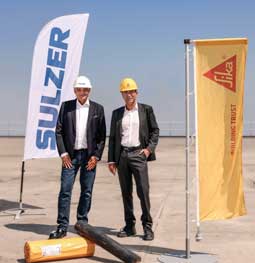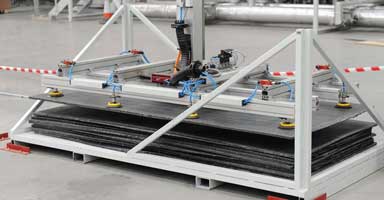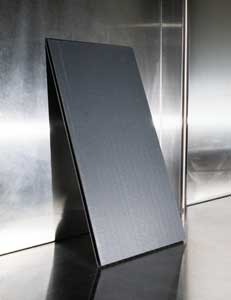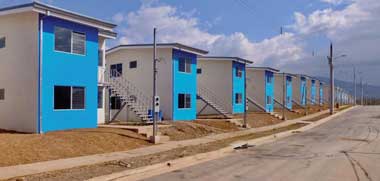Building industry: On the holy grail of sustainability
With around 2 million tonnes of plastic waste generated in the European construction industry each year, recycling these complex materials is highly fragmented, technically demanding, and often inefficient. As a result, the majority of construction plastics are disposed by the end of their lifecycle, since existing mechanical recycling methods produce low-quality materials that are not suitable for reuse.

Thus, engineering company Sulzer and chemicals firm Sika have signed an MoU to establish a joint venture to advance plastics recycling in the construction industry. The aim is to combine the strengths of both companies: Sika's extensive expertise in polymer applications and high-performance building materials and Sulzer's process knowledge in chemical recycling.
The joint venture, based in Zurich, Switzerland, will be founded as an independent company, with each partner holding a 50% stake. Operational activities will commence in the second half of 2025 with pilot projects in Germany, Austria and Switzerland.
With this joint venture, Sika and Sulzer are developing a system for the collection, processing and reuse of construction plastics using mechanical and chemical processes.
The joint venture between Sika and Sulzer will close gaps in the value chain of the construction industry, and will be complemented by local partners, such as logistics and recycling companies, which will be integrated into specific process steps. Recycled materials will thus be reincorporated into the manufacturing process.
Creating construction boards from electronic waste
In the US, digital imaging firm Canon and recycler Repolytex have a unique solution that skips the costly and complex process of sorting mixed plastics from electronics.
Instead, Repolytex separates the metals and processes the mixed plastics into a powder, creating a hybrid material to manufacture durable sheeting. The resulting boards are weather-resistant, dimensionally stable, and suitable for construction and marine applications.

Founded by industry veterans with decades of experience in metal sorting, Repolytex says it recognised the growing challenge of plastic waste from electronic devices, which led it to develop the process.
Prior to the development of the technology, recycled electronics plastic was predominantly shipped overseas, contributing to environmental concerns and economic inefficiencies.
It adds that unlike other recycling methods that are limited by polymer compatibility, its proprietary process enables the company to effectively combine and repurpose various types of plastic. “This approach not only reduces plastic waste but also produces highperformance construction materials that are sustainable and cost-effective,” says the firm that operates from a flagship facility in Madison, North Carolina.
Countering trade tariffs with homegrown sustainable materials
Another US materials firm Supersede recently secured US$10 million in seed funding, consisting of US$5 million in convertible debt and US$5 million in senior secured equipment financing, to scale production of its Supersede Marine Board, a recyclable replacement for marine-grade plywood.

The investment includes participation from a major US building products distributor and circular economy firm Closed Loop Partners, as well as angel groups and individual investors.
As supply chain instability and material costs increase, particularly amid rising trade barriers, Supersede is positioned to disrupt the US market for structural wood panels, valued at over US$30 billion. The company’s solution arrives at a critical moment for sectors like boat, RV, and modular home manufacturing.
Marine-grade plywood has long been the standard for these sectors, but the material comes with drawbacks as it’s reliant on volatile resource extraction, prone to water damage, contains formaldehyde-based binders, and lacks an established end-of-life pathway, often ending up in landfills.
Launched last year, Supersede’s marine board offers a 100% waterproof, rot-proof, and recyclable alternative to plywood that integrates seamlessly into existing manufacturing workflows, according to the company. Using recycled polypropylene (rPP), the company's patented extrusion process creates high-strength structural panels that are said to outperform traditional plywood in water resistance, fastener retention, compressive strength and durability.
The panels are said to eliminate the use of toxic chemicals like formaldehyde and chromated copper arsenate, thus improving safety for workers and end users. The company says it plans to localise feedstock sourcing, thereby reducing transportation emissions and creating jobs locally as well.
Supersede says its solution eliminates multiple manufacturing steps, since the panels do not require sanding, sealing or drying, reducing labour costs.
The company also runs a buyback program to support closed-loop recycling: offcuts and end-of-life products can be reprocessed into new boards, helping manufacturers achieve zero-waste targets without compromising performance.
Sean Petterson, CEO/Co-Founder of Supersede said the funding will allow the company to scale up faster, including building a second manufacturing facility that will triple production capacity and add over 50 new jobs.

Meanwhile, CRDC Global, a green building materials and machinery technology company founded by the Centre for Regenerative Design & Collaboration (CRDC) in Costa Rica in 2018, is promoting its latest Resin8 Core product, built on the success of the existing Resin8 solution that combines concrete and plastics.
To be commercially launched in 2026, Resin8 Core is created when Resin8’s recycled content reacts with cement-kiln emissions and captures CO2e before it can escape to the atmosphere. Captured gases get stored in a lightweight coating of mineralised limestone on each Resin8 particle, forming the Resin8 Core.
So what is Resin8? CRDC's patented low-carbon technology uses all types of shredded, mixed plastic waste that is mixed with minerals and processed through extrusion to create Resin8. This lightweight mineral polymer can be utilised in both structural and nonstructural concrete applications.

CRDC says independent bodies have tested its material and it has demonstrated an increase in compression strength, flexibility, fire/thermal resistance and acoustic properties. The company also claims that concrete applications using Resin8 exceed ASTM standards.
Resin8 is also considered as a viable component for 3D printed concrete, as highlighted in an article in Elsevier’s journal Construction and Building Materials. The research evaluated Resin8 mix with elements such as fly ash and sand. It noted an improved bond strength between the layers of the printed concrete with the addition of Resin8.
The company has commercial manufacturing operations in Costa Rica, South Africa, Australia, and the US.
(PRA)SUBSCRIBE to Get the Latest Updates from PRA Click Here»









